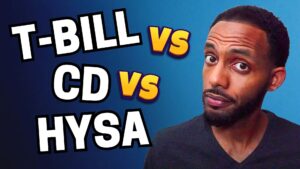There is this one savings account that you might be missing out on and it’s one that I personally didn’t start saving in until a few years ago. It is the HSA – Health Savings Account. Simply put, an HSA is an IRA on beast-mode and today I’m going to talk about why having an HSA is a must.
Ok, so we’re taking about health savings accounts, let’s start start with probably the most popular reason to have an HSA – The money you put in an HSA has a triple-tax advantage. Your money goes in tax-free, grows tax-free and can be withdrawn for qualified medical expenses tax-free. This is why you’ll hear people say an HSA has a triple tax advantage. You’re not paying taxes on the money you contribute and when you invest the money you contribute in index funds that are available that money will grow without you having any tax bills. In fact, you’ll reduce your tax liability when you file taxes. And as long as you never touch your HSA dollars for qualified medical expenses you could potentially have a lot of money in your 60s, 70s and so on to use for medical expenses ANDDDDD once you turn 65 you can even use the HSA funds for expenses that aren’t qualified medical expenses without penalty and whatever you withdraw would be subject to ordinary income taxes. And another feature is if you work for a company and contribute pre-tax dollars to your HSA that money should not be subject to income AND FICA taxes (social security and medicare). But with after tax dollars you still can deduct the contributions from your income but you lose the opportunity to not be subject to FICA taxes.
Now Let’s talk about contribution limits:
For calendar year 2023, the annual limitation on deductions under § 223(b)(2)(A) for an individual with self-only coverage under a high deductible health plan is $3,850. For calendar year 2023, the annual limitation on deductions under § 223(b)(2)(B) for an individual with family coverage under a high deductible health plan is $7,750.
How do you qualify for a health savings account?
To qualify for an HSA you have to have a qualifying high deductible health plan with an annual deductible that is not less than $1,500 for self-only coverage or $3,000 for family coverage, and for which the annual out-of-pocket expenses (deductibles, co-payments, and other amounts, but not premiums) do not exceed $7,500 for self-only coverage or $15,000 for family coverage.
Where to Open a Health Savings Account
I was able to open an HSA through a high deductible health plan offered by my employer. So the first place I would check is with your employer. You should be able to review the different health options available to you and when open enrollment rolls around make sure to see if the health plan option that allows you to get an HSA is right for you.
If your employer doesn’t offer a health plan or maybe you’re self employed or any reason that you need to shop around for an HSA well I can tell you that Fidelity and Optum Bank are just a couple names that come to mind that provide you with an HSA as long as you have a high deductible health plan. My employer offers an HSA with Optum Bank and it isn’t perfect, but we do get access to one of my favorite investments which Vanguards Total Stock Market Index Fund VTSAX, so anything above the $2k minimum balance we have to keep as cash gets invested into VTSAX and watch the money grow tax free over the next few decades.
Health Savings Account Tips
- You don’t have to use an HSA to pay for a medical expense right away. Save the medical expense receipts, let the HSA grow and if needed you can reimburse yourself for those medical expenses anytime in the future. Of course this means you’ll have to figure out a system that will help you maintain a good record of your medical expenses.
- As I mentioned before you can invest your HSA money in index funds that may be available and let the money grow tax-free. But one thing I try to remind myself is to invest in index funds that are low cost.
- After the age of 65 your HSA funds can be withdrawn for anything similar to a Traditional IRA or 401(k). You would just have to pay your income tax on the withdrawals. However, if you try to use the funds in an HSA for non-qualified expenses before age 65, you will pay income tax AND a 20% penalty. Ouch!
- If you’re employed by a company, many times the company will provide funds yearly to put in your HSA. For example, a company can offer HSA dollars if you get a physical or watch a health video. That’s free money for you and your family to fund your HSA without having to use your own personal funds. This has become a very great benefit for us. We basically met the majority of our deductible through company contributed money into our HSA, because of the rewards.
HSAs are a great way to fund future medical expenses like long term care insurance premiums and future health insurance premiums. You have an amazing opportunity to act today and not worry later in life.
What Are the Downsides of an HSA?
Really, there are no downsides in my opinion of having an HSA, but I will admit, having a high deductible for your health plan may discourage people from looking into an HSA. Since you are responsible for 100% of expenses until you meet your deductible. That can be seen as an issue. Still, if a company offers funding into your HSA then you might be able to meet close to the deductible with that like we did. If you’re young typically you should be in good health. You don’t have huge medical expenses, meaning you get to save more in your HSA over time. This is a huge advantage for young people looking to save for the future.
My recommendation to dealing with the high deductible is having at least a 3-month emergency fund that has the deductible and out-of-pocket max built in. For example, let’s your deductible is $3,000 for the family and the out-of-pocket max is $8,000. Ideally, you will want to build up an emergency fund of $8,000 to cover the deductible and all the medical bills you would be paying a percentage of until you hit that coinsurance max. If this isn’t clear, you can always reach out to your Human Resources department or the customer service people with whichever financial institution your HSA is with.
Now I get it there are people who just are not ready to save this amount of money. Well, no worries an HSA may not be the plan for you right now. And that’s perfectly fine. You can still put your money in a high yield savings account and would only have to worry about paying interest tax at your ordinary income tax rate. I talk more about one of my favorite places to get a high yield savings account in the video on the screen, check it out and I’ll see you over there.


